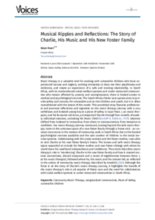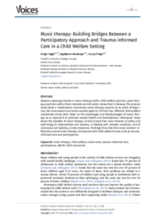Displaying 171 - 180 of 496
This paper presents findings on the previous life experiences of an entire cohort of ‘difficult to place’ adoptees who were placed in Australia over 26 years.
This phenomenological study focused on the experiences, aspirations, and fears of orphaned children living in and outside the orphanage in the Philippines.
This study examined variability in problem behavior among toddlers entering new foster care placements and identified related child and parenting characteristics.
This article examines family‐based interventions designed to increase parenting effectiveness, fathers' positive involvement, and couple relationship quality, all with the goal of enhancing children's development.
Based on attachment theory, this study was conducted to analyze the contact between these children and their biological parents, and the factors affecting this contact.
This anecdotal story features professional and personal reflections and vignettes on the music therapy journey with a very withdrawn and isolated young boy at a place of safety in Cape Town, South Africa.
Despite a growing interest in music therapy within child welfare practice, music therapy practices within these contexts are still under-researched in Norway. The present study takes a collaborative community music therapy practice as its point of departure.
This study examined adopted adolescents’ levels of attachment security to parents and aggressiveness as compared to those of community nonadopted adolescents and of clinical nonadopted adolescents.
This study tested the hypotheses that inverse relationships would exist between connectedness in three social domains (i.e., caregiver, peers, and school) and suicidal ideation over time.
To illustrate design and implementation of the Strategies for Enhancing Early Developmental Success (SEEDS) Preschool Program, aimed at promoting school readiness in families connected to the child welfare system, the current paper uses parent- and teacher-reported data to summarize the progress of three participating families with diverse histories and presenting issues.


